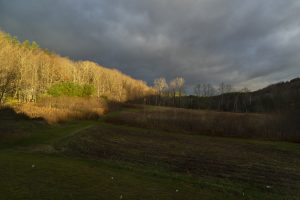November 28, 2021
Delivered by the Rev. Dr. Margaret Bullitt-Jonas
Church of Reconciliation, San Antonio, Texas
Psalm 25:1-9
Jeremiah 33:14-16
1 Thessalonians 3:9-13
Luke 21:25-36
Standing up when things fall apart
Friends, I am blessed to be with you this morning. Thank you for inviting me to preach. I was hoping to join you in person because I’d planned to come to San Antonio to speak at the annual meeting of the American Academy of Religion. But because of the pandemic, my presentation went virtual, so here I am at home, bringing greetings from the East Coast, where I serve the two Episcopal dioceses in Massachusetts as well as the United Church of Christ in southern New England. In this ecumenical role, I speak to people of faith about our call to cherish and protect God’s creation. If you’d like to know more about what I’m up to, please visit my Website, RevivingCreation.org. I want to give a special shoutout to members of your Creation Care team – thank you for your leadership. If there’s anything I can do to support you, please let me know.
I can’t think of a better day to be with you than today, as we launch the season of Advent and begin a new church year. During these four weeks leading up to Christmas, we prepare to celebrate the first coming of Christ, when God became incarnate in Jesus’ birth in Bethlehem. And we prepare for his second coming, too. We look ahead to that last, great day sometime in the future when Christ will come again, when everything will be gathered up in love, when all that is broken will be healed, all that is estranged will be reconciled and forgiven, and the Lord of life will return at last to reign in glory.

Photo credit: Robert A. Jonas
It’s scary stuff. And it resonates with our own experience of a shaking world. Snow in Houston. Triple digit temperatures in the Pacific Northwest. Withered crops and empty reservoirs in the American Southwest. Shorelines dissolving in Florida. Flash floods rising so quickly that people drown in their basement apartments. Wildfires so hot that they generate their own storms. Oceans emptying of life and filling with plastic. Changes in the jet stream. Changes in the Gulf stream.
The signs of a changing climate are visible everywhere. Around the world, throngs of people are already on the move, because drought or crop failure or fires or storms have dislodged them from their homes.
Indeed, the once-stable web of life is unraveling before our eyes. Huge populations of creatures have vanished in less than 50 years. Human activity has wiped out 60% of the world’s mammals, reptiles, amphibians, birds, and fish since 1970.1 With dismay, scientists are describing what they call a “biological annihilation.”2 And about one million plant and animal species are at risk of extinction, many within decades.
The world is reeling, so I come to today’s Gospel passage with relief – it tells the truth. It speaks to our condition. The Bible has wisdom to convey in apocalyptic times like these. What is “apocalypse”? It comes from the Greek word “kalypto,” which means “to cover” or “to hide.” “Apocalypse” refers to a great unveiling, a lifting of the veil of illusion. In that sense, surely, we live in apocalyptic times: something like scales have fallen from our eyes and everything that was hidden is being laid bare.
For instance, now we know that we can’t take the natural world for granted. Now we see the miracle of what we once thought would be ours forever: predictable seasons, moderate weather, thriving coral reefs, ice sheets as big as a continent. Now we know that the stable natural world into which you and I were born is coming apart, and – to quote a conservation wildlife photographer – that “even the lowliest ants or butterflies can no longer be taken for granted ever again.”3
Do apocalyptic, end-time passages like these mean that we should passively accept natural disasters that result from human-caused climate change as somehow preordained and part of God’s plan? That’s what some Christians would have us believe, but I don’t see it that way. I don’t for one minute believe that God wants human beings to burn the Earth to a crisp. I don’t for one minute believe that biblical end-time passages give human beings a license to rip apart the web of life and to destroy the world that our Creator proclaimed “very good” (Genesis 1:31). On the contrary, I believe that God’s creative, holy presence fills our precious, living planet, and that all of it belongs to God – meadows, rivers, soils and seeds, animals and oceans. As the psalmist says, “The earth is the Lord’s and all that is in it” (Psalm 24:1). And the very first task given to human beings is to care for the earth, to serve as custodians and stewards.
As I see it, the Bible’s end-time passages and their frightening imagery of chaos and distress were not given to us so that we can indulge in wasteful and disheartening political rhetoric, in helplessness, resignation, or fatalism, but just the opposite: in order to sustain our courage, hope, and perseverance even in the midst of crisis.

Photo credit: Robert A. Jonas
A second message: Don’t be afraid. Although many people “will faint from fear and foreboding of what is coming upon the world,” followers of Jesus should take heart. “Now when these things begin to take place,” says Jesus, “stand up and raise your heads, because your redemption is drawing near” (Luke 21:28). “Stand up!” he says. “And raise your heads!” What bracing words these are when we may feel like curling up in a ball and ducking our head under a pillow! It’s easy to feel hopeless about ecological collapse and climate change. It’s easy to feel helpless and overwhelmed. What can I possibly do? We may say to ourselves. What difference can I possibly make? But here comes Jesus, telling us to stand up and not be afraid, for our redemption is drawing near. He is very close (Luke 21:27).
And here comes message number three: Don’t fall asleep. Stay awake, says Jesus. “Be alert at all times” (Luke 21:36). Look for the small but telling signs that God is in our midst, bringing forth something new. Just as the branch of a fig tree becomes tender and puts forth its first, soft leaves, assuring us that summer’s abundance is near, so Jesus urges us to notice that even in the midst of chaos, violence, and endings, God’s kingdom is drawing near. In the very midst of endings, something new is being born.
As I hear it, Jesus is calling us to stand up and take part in that birth – the birth of a new community, the birth of a new society that lives more lightly on God’s good Earth and that treats human beings and other-than-human beings with reverence, compassion, and respect. In this perilous time, God calls us to stand up, raise our heads, and bear witness in word and deed to God’s never-failing love, which embraces the whole creation.
And when it comes to healing, there is so much we can do! Earlier this year the Episcopal bishops in Massachusetts declared a climate emergency. Our two dioceses have begun to work together in a more coordinated way as we discuss how we can pray, learn, act, and advocate on behalf of God’s creation. The Diocese of Western Massachusetts has web pages on Creation care loaded with ideas about ways to make a difference. Some actions are simple, like eating less meat and moving to a plant-based diet, recycling more, driving less, protecting trees, and reducing our use of fossil fuels in every way we can. Other actions are bigger and bolder and address systemic change. That’s important, because the scope and speed of the climate crisis require more than changes in individual behavior – they require massive, collective action and a push for policies that help us move away quickly from fossil fuels and that encourage clean renewable energy like sun and wind. A just and equitable transition to a new economy means creating lots of good green jobs for folks now working in the fossil fuel industry, and it means ensuring that historically marginalized and low-income communities – the people hurt first and hardest by climate change – have a voice at the table where decisions are made. If humanity is going to keep living on a reasonably habitable planet, then this transition must happen now. It’s up to us to insist that political leaders lead the transition – especially in places where so much of the economy and so many jobs are dependent on fossil fuels.
Here’s the last thing I’ll say. After COP26, the U.N. climate summit that just finished in Glasgow, every member of the Episcopal delegation made it clear that “protecting the Earth and preventing human suffering are not merely political talking points but central tenets of the Episcopal faith.”4 I was especially touched by the words of the Rev. Rachel Taber-Hamilton, a delegate from the Diocese of Olympia and a member of the Shackan First Nation people. She said: “The faith of re-greening the world must become as central to our theology, and to our worship, as crucifixion and resurrection… We must give nothing less than all we have and all we are in order to assure new life if generations are to follow us at all. The world to come that we pray for in our Sunday worship is ours to entomb or to liberate.”5
I pray that our Church – the Church of Reconciliation and our Church as a whole – will become a beacon of light and a leader of bold climate action. As we step into this Advent season and into a new year, may Jesus keep us steadfast in faith and abounding in love for one another and for all, until his coming in glory. Amen.
________________________________________________________________________________
NOTE: To subscribe to my monthly newsletter, Creation Care Network e-news, please click here. A video of "Standing Up When Things Fall Apart" is posted at my YouTube channel.
________________________________________________________________________________
1. “A Warning Sign from Our Planet: Nature Needs Life Support,” Living Planet Report 2018, World Wildlife Fund, Oct. 30, 2018
2. Gerardo Ceballos, Paul R. Ehrlich, and Rodolfo Dirzo, “Biological annihilation via the ongoing sixth mass extinction signaled by vertebrate population losses and declines,” PNAS (Proceedings of the National Academy of Sciences of the United States of America), July 25, 2017.
3. Cyril Christo, “Climate change is really Apocalypse Now,” The Hill, July 17, 2021.
4. Egan Millard, “Episcopal delegates to COP26 climate conference share lessons of hope and struggle with the church,” Episcopal News Service, November 19, 2021.
5. The Rev. Rachel Taber-Hamilton, quoted by Millard, “Episcopal delegates to COP26.”
